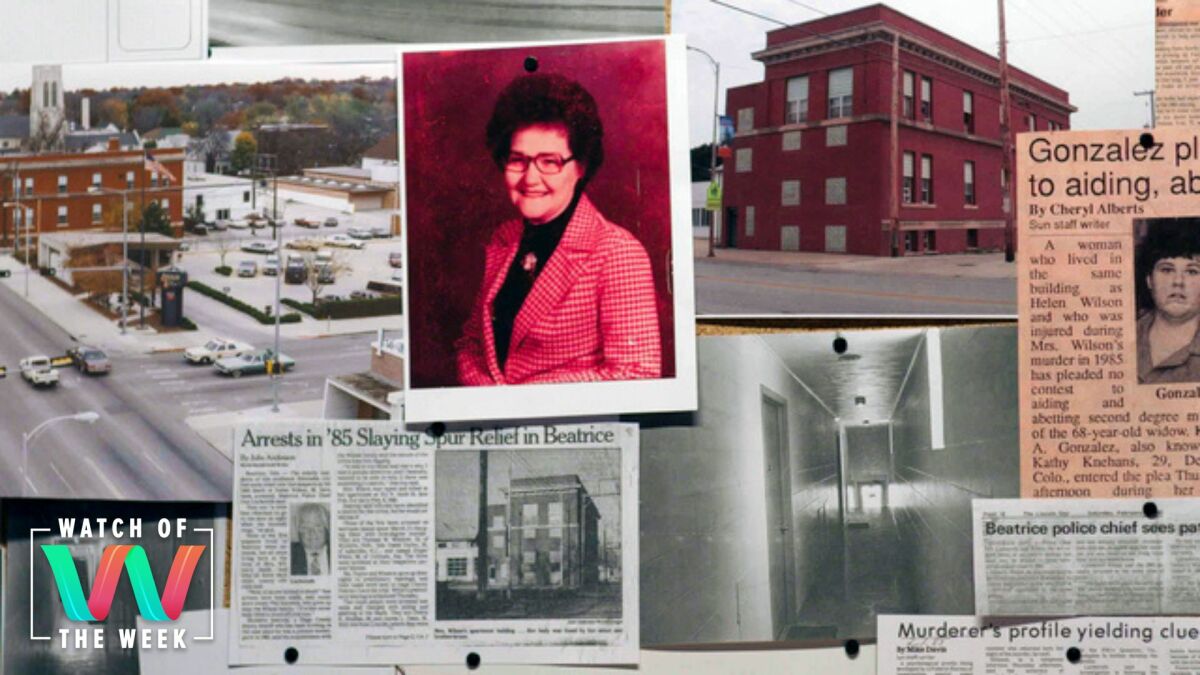Entertainment
‘Mind Over Murder’ review: Nanfu Wang’s HBO doc is the must-see true crime series of 2022

The best true-crime show of 2022 concludes this Monday on HBO. So now is the time to catch you up on the horror and humanity throbbing at the core of Mind Over Murder.
Over the first five episodes of this six-part documentary series, director Nanfu Wang (One Child Nation, In the Same Breath) has guided audiences through the snarled tale of the Beatrice Six, which began in 1985 when beloved grandmother Helen Wilson was raped and murdered in her Beatrice, Nebraska, apartment. Police were at a loss for who could have committed such a senseless and brutal crime. Then, Gage County Sheriff’s deputy Burt Searcey began pulling in a string of six suspects. Under dogged interrogation, five would give confessions. All would serve time. But as decades passed and appeals were processed, all six would be exonerated. The confessions were false. DNA evidence suggests none of the infamous six were even in Wilson’s home. So how did what one attorney called “the greatest travesty of justice in Nebraska history” happen?
Incredibly, Wang steps audiences through Searcey’s investigation with the man himself in talking-head interviews. Woven within theories on the Wilson murder are conflicting accounts from lawyers, other police investigators, and four of the Beatrice Six. Also interviewed are the surviving family members of Wilson and of the late Joseph White, the supposed Beatrice Six ringleader who died not long after being exonerated.
From early on, the series crackles with tension between conflicting stories, and two sides are firmly established: Searcey and the Wilson family, who sees the cop as their hero of justice, and the Beatrice Six and their supporters, who argue that the group was coerced into false confessions. Dealing in murder, sexual assault, brainwashing, and police corruption, Mind Over Murder is a grim affair, but not a ghoulish one, because Wang explores this knot of narratives with a deep-seated empathy for all involved.
While Wang is off-camera in the interviews, her soft voice can be heard, occasionally pressing gently but firmly for more from her subjects. From the way both sides of this divide open up to her, we get the sense that all involved felt she was giving them a safe space to be heard. Considering that the Six had been denounced in the press for decades ahead of their appeal, and the Wilsons have felt attacked every time the original investigation is called into question by the media, most lines of questioning here are touchy. Yet Wang’s patience and perseverance are reflected in a pacing that gives audiences the space to take it all in. So, a scene of shocking revelation or a heart-wrenching emotional truth is followed by several peaceful shots of Beatrice or a quiet moment with the interview subject to let them work through the jolt.
Mind Over Matter has its Jinx moment in the finale

Credit: HBO Max
One of the most shocking moments of true-crime television came from HBO in 2015, when director Andrew Jarecki pressed on the subject of his docuseries The Jinx: The Life and Deaths of Robert Durst about his alleged string of murders. The suspected wife-killer, thinking his mic was off, seemed to admit — amid a bunch of burps — that he’d been found out. In Mind Over Murder’s climax, Wang presses Burt Searcey about his part in the Beatrice Six’s wrongful conviction. It’s a two-part confrontation that is raw and riveting between an earnest interviewer and an agitated interviewee.
First, in the cold open, Wang sits Searcey down to watch a rough cut of the series, a series that increasingly paints him not as a hero cop, but as an ego-driven manipulator. As a former friend of Searcey’s picks apart his investigation, he scoffs and clucks. But something horrid happens as the Six and their loved ones share their stories of anguish. Searcey stops watching and begins to play with his cell phone.
His indifference is chilling and grows colder as Wang (off-camera) says she’ll pause so he won’t miss anything. Searcey bristles, teasing a later confrontation at his flower shop, where he has his last chance to reflect and at least recognize his responsibility in the wrongful convictions. Like The Jinx’s memorable moment, these scenes are an electrifying insight into a man who has been holding up an increasingly wobbly front for decades. And it’s a righteous thrill to witness that facade teeter.
The play is the thing

Credit: HBO Max
The other fascinating element of Mind Over Matter is how Wang knits in the perspective of the residents of Beatrice, who’ve seen this saga play out for years in the news and heard whispers of speculation across picket fences for decades. There’s a smattering of interviews that talk to people where they are: their garage, their barber shop, their porch. But the most profound interactions are found in rehearsals for the Beatrice Community Player’s 2021 production of Gage County, NE. Created in collaboration with the HBO doc, this play is a theatrical re-enactment of the entire Beatrice Six story, created by combing court records, investigative materials, news reports, and first-hand accounts.
After weeks of watching this play develop in cautious and challenging rehearsals, episode 6 of Mind Over Murder finally unveils its opening weekend. But first, Wang reveals the fear that’s building around the production. Across social media, there is a preemptive backlash, accusing the production’s players of being as bad as the killer of Helen Wilson. In one tense scene, the company talks about their concerns not only during the show but afterward. Will the anger at the Beatrice Six follow them as they try to live their lives?
Clip courtesy of HBO.
It’s an understandable fear. But remarkably, Mind Over Matter captures not disaster but a miracle in that theater: people changing their minds.
The glimmering hope found in Mind Over Murder

Credit: HBO Max
Though the Wilson family has sensible reservations about the play production, several of their clan turn up to the show. Also in attendance are some of the Six, as well as their family and other supporters. Wang presents snippets of the play, which repeat exposition we’ve already learned. But this time, we see how the people of Beatrice react to these interrogations and to the human side of the Six that had so long been papered over by horror stories and fear. Wang’s camera reveals the theater audience’s dropped jaws and teary eyes. Then, after the show, members of both sides of the divide are seen hugging the actors, who took a recognized risk to take to that stage.
I’m a big believer in the power of art to heal our savaged souls. In Mind Over Matter, Wang captures such solace in that playhouse. She makes us witness to the incredible ability of humans to change our minds. However, she also recognizes the obstacles on that journey. As one of the Wilson family explains frankly, 36 years is a long time to believe in your heart something is true, then accept you are wrong. Wang’s empathy for all the victims of this crime and the subsequent injustices not only focuses her lens on the Wilson family as they grapple with what they thought they knew and their dawning realizations. She also orchestrates an unexpected introduction, where across a dinner table, two heartsick families find comfort in their shared grief.
True Crime as a genre can be deeply problematic, often veering into grisly rubbernecking and even exploitation of tragedy. But within this space, there’s the chance to look at what’s happened and probe for what we might learn from it. Not so much safety lessons, but for uncomfortable truths about our world as it is — minus the smoky-voiced narration, copaganda narratives, or slick showmanship of many true-crime shows.
Mind Over Murder mindfully dodges the pitfalls of exploitative true crime to find the humanity behind the headlines. Wang speaks with warring sides, and both offer honesty and vulnerability, even when it’s hard to hear. That might be enough: a thorough look at this story that has defined the lives of Searcey, the Wilsons, the Six, and even Gage County, for better or worse, whether they like it or not. All that was a grand task Wang handled with aplomb. Yet with this finale, Wang went further. She pushed to the tricky journey of moving on.
Resolution is not something true crime shows can honestly offer. Even after the bang of the gavel, there’s an aftermath of emotion, psychological trauma, and untold social consequences. Covering nearly 40 years, Mind Over Murder wades into this aftermath, validating the pain of its subjects, and then — amazingly — capturing on camera their path to healing.
It’s not a happy ending, but to attempt one would be a slap in the face to the authenticity and emotional complexity that Wang has so meticulously woven over this limited series. Instead, she shines a light on the path to moving on, but won’t let us forget the lingering darkness. Progress is never a straight line. Grief is a monster. Healing is hard. And Mind Over Murder recognizes all that with its final haunting words.
How to watch: The HBO documentary series (opens in a new tab)Mind Over Murder(opens in a new tab) is now streaming on HBO Max. The (opens in a new tab)Mind Over Murder(opens in a new tab) finale will air on Monday, July 25 at 10 p.m. ET on HBO and HBO Max.(opens in a new tab)
-

 Business7 days ago
Business7 days agoTikTok Shop expands its secondhand luxury fashion offering to the UK
-

 Business6 days ago
Business6 days agoUnitedHealth says Change hackers stole health data on ‘substantial proportion of people in America’
-

 Business6 days ago
Business6 days agoMood.camera is an iOS app that feels like using a retro analog camera
-

 Business4 days ago
Business4 days agoTesla’s new growth plan is centered around mysterious cheaper models
-

 Business3 days ago
Business3 days agoXaira, an AI drug discovery startup, launches with a massive $1B, says it’s ‘ready’ to start developing drugs
-

 Business4 days ago
Business4 days agoUK probes Amazon and Microsoft over AI partnerships with Mistral, Anthropic, and Inflection
-

 Entertainment6 days ago
Entertainment6 days agoFurious Watcher fans are blasting it as ‘greedy’ over paid subscription service
-

 Business5 days ago
Business5 days agoTwo widow founders launch DayNew, a social platform for people dealing with grief and trauma






















